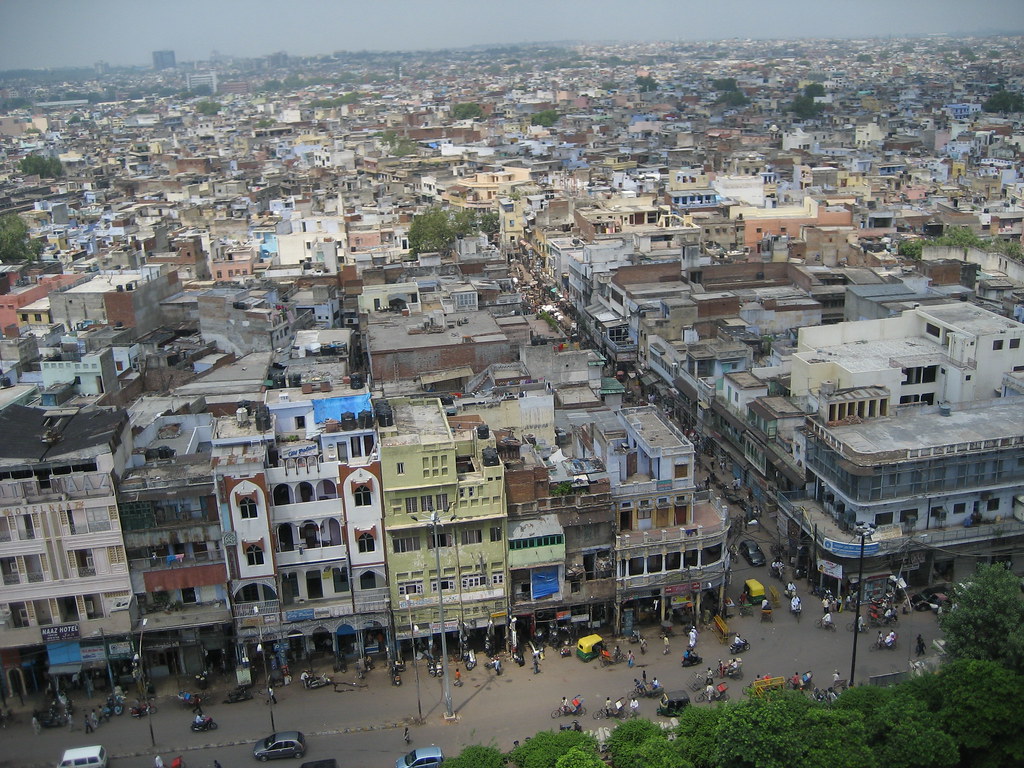Friday, August 11, 2006
American Express. Close. All India
It's difficult, and not necessarily worthwhile for me, to attempt the whirlwind tour of a city. I prefer to select a few places, vaguely map out a plan of action, and see what happens. Rarely does the plan follow its course, where transportation is found -- at a reasonable price -- when needed; there are no accidents or strikes blocking the way; no holidays or siesta hours keeping the gates or doors closed; no lethargy or apathy encouraging me to return to my room, take a cold shower, and stand in front of the fan. And this doesn't necessarily apply only to the sights; at times buying a bus or train ticket is an adventure, or getting something (somewhat) safe to eat, or changing money.
For the first and probably last time in my life, I purchased travelers cheques prior to an excursion abroad. It's much easier to carry small amounts of cash and then bank on the ubiquity of ATM machines. But this time I thought it'd be prudent to play it safe. After all, "it's India," everyone had told me. "You gotta be safe over there."
I headed down to Connaught Place, the area of town that puts the New in New Delhi. It's where you're most likely to rub shoulders with Delhi's high society over a cup of decent (non-instant) coffee or some I'm-not-so-sure-what at KFC. It's also where the majority of the official money changers are, where I would be able to turn my AMEX travelers cheques into something I could use. At the $250 a night Sheraton, travelers cheques and cash are interchangeable; at the 250 Rupee a night Hotel Vishal, it's a much different story.
Although my map had told me precisely where the AMEX office was, I combed the area and came up empty. One guy told me it was one way, another told me it was the opposite way, and a third didn't seem to understand what I was saying or why I was saying it to him. I suppose I was naive in assuming that AMEX would choose a more noticeable, if not ostentatious, sign. I eventually spotted a small placard, about (my) chest high, hidden from sight by a small group of cell phone-wielding teenage Delhiites.
I explained my business to the guard in the doorway and he motioned me up a winding staircase. About halfway up I was again encouraged to state my business to another semi-official looking gentleman. He responded with the characteristic apologetic head wobble: "American Express. Close. 10 October 2005. All India."
"But the sign on the..."
"American Express. Close. 10 October 2005. All India. Now, only Indians."
He escorts me outside. "Come," he says and proceeds to lead me to no less than four different moneychangers, each a touch shadier than the last. And each time he lingers, presumably awaiting a commission he earns on what I change. None of the rates are particularly appealing, so I eventually part ways and meander a bit more.
It seems somewhat disingenuous to wander the streets, spending an extra half hour or more trying to get 45.5 rupees to the dollar as opposed to 45. I would, however, much rather be taken for a few rupees here and there by a chai vendor or a rickshaw driver than by someone basking in the glory of an air-conditioned office.
About 45 minutes later, I again climb the winding staircase and again am greeted by the same guy. "American Express. Close. All India," he affirms and pilots me out of the building. This time he starts quoting exchange rates.
It's easy to get lost in Delhi. The streets are hardly marked. Building signs are often faded or usurped by signs of newer and/or bigger buildings. There are plenty of people around to ask directions of, yet after most interactions you fail to feel more confident than if you hadn't asked at all. Many people, I think, truly have no idea where you're going. Others have no idea what you're saying. Some know exactly where you want to go and can help you get there. I'm sure there are plenty more types of responses and responders, but the group I find most interesting is a more insidious one: those that know where you want to go, but take you elsewhere.
With some, it's obvious; with others, it's not as much so. It's often hard to tell the difference, because someone may appear totally genuine at the start -- or may work for an official agency or the government -- and then lead you astray. At what point do you succumb to your desire to be in control of each and every situation versus the desire to trust someone and be rewarded for it?
I smile, give him the head wobble and walk away. I choose another fairly reputable-looking operation and head in, ready to accept a lower-than-desired exchange rate, but with a budding knowledge of the system -- and a thirst for some A/C driven by wandering the streets in 100 degree heat.
Now that I think about it, I still don't know if American Express is really closed.
.jpg)
.jpg)


No comments yet